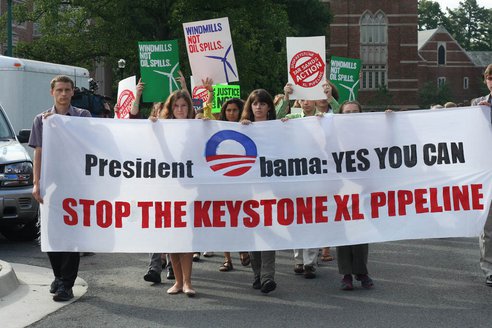Stephen Harper’s government and a big part of Canada’s ruling establishment are in a frenzy over Keystone XL.
The Conservatives and their provincial allies have spent millions (probably tens of millions) of dollars in public money to push a pipeline that will export Canadian jobs, trample First Nations rights and, overall, be bad for the environment. But it’ll be good for the profit margins of some of their oil industry friends.
In recent weeks, a half dozen Conservative ministers have trekked south to push for the approval of the pipeline while Harper has made it the top priority for Canada’s embassy and 22 consular offices in the U.S for the last three years.
With a team at the Washington embassy devoted entirely to KXL, Canadian officials have presented at town council meetings, responded to critical press commentary, taken newspaper reporters to high-end restaurants and organized countless other activities in their zest for the pipeline. In a recent example of this diplomacy at work the Canadian consul general for the Pacific Northwest, Denis Stevens, spoke to Idaho’s House and Senate saying that KXL “would allow you to free yourself completely from oil imports from Venezuela.”
Next month, Alberta Premier Alison Redford will make her fourth trip to Washington in 19 months and over the weekend the provincial government took out a $30,000 half page advertisement in the New York Times promoting KXL. For his part, Saskatchewan Premier Brad Wall has flown to Washington, worked with U.S. governors to push the pipeline and paid $50,000 for a Canada West Foundation study that absurdly claimed Canada loses between $30 million and $70 million every day the pipeline is not built.
TransCanada has spent millions of dollars lobbying federal and state politicians as well as establishing pro-KXL ‘grassroots’ groups such as Nebraskans for Jobs and Energy Independence. The Calgary-based company has been supported in their efforts by the Canadian Association of Petroleum Producers and business columnists who are taking an increasingly strident tone.
In a ludicrous article entitled “The New York Times calls for war on Canadian oil,” Financial Post editor Terence Corcoran condemned an editorial by the U.S. paper stating: “It looks like the Keystone XL pipeline is coming down to a nasty war on Canada.”
Apparently, Thomas Mulcair and half of all Canadians who tell pollsters they oppose KXL are part of this war on Canada.
A number of media outlets insinuated that the leader of the official opposition was a traitor for voicing mild criticism of KXL during a recent trip to Washington. An Ottawa Citizen editorial demanded “Whose side is Mulcair on?” while a Calgary Herald editorial foamed about how Mulcair allegedly “disparage[d] Canada,” “oppose[d] our own country on foreign soil” and (in case the point still wasn’t clear) “there is nothing loyal about attacking one’s own government and country with our nation’s largest trading partner.”
The Conservatives stoked this McCarthyite sentiment with foreign minister John Baird saying Mulcair was “trash talking Canada” and Saskatchewan Premier Brad Wall claiming Mulcair “betrays our country’s national interest.”
Unfortunately, the least principled political leaders will tend to succumb to this type of intimidation. The new head of the Saskatchewan NDP, Cam Broten, caved in the face of Premier Wall’s demand to “have the courage to stand up, go against Mr. Mulcair and support the Keystone pipeline.” (Real political courage, of course, is to stand with the federal and provincial government, big oil and entire media establishment.)
In a bad omen for his leadership, Broten responded to Premier Wall’s pressure by telling reporters: “To clear the record … I support the Keystone XL pipeline because of a triple bottom line assessment looking at environmental, economic and social reasons.”
But Broten is wrong on all three counts. KXL will accelerate already unsustainable rates of Alberta bitumen extraction, undermine a domestic industrial policy and does not have a social license.
Despite near unanimous support from big media commentators, half of the public isn’t on side. A November poll found that 47 per cent of Canadians were against KXL and 53 per cent in favour while a January study found 41.7 per cent with an unfavourable impression and 45.2 per cent favourable. Both of these polls were taken prior to the big demonstration against KXL in Washington last month.
With results like this and a growing doubt around the ability of oil companies to live up to their environmental responsibility, it is no surprise that half the public can see right through the KXL frenzy.
Dave Coles is President of the Communications, Energy and Paperworkers Union of Canada.



